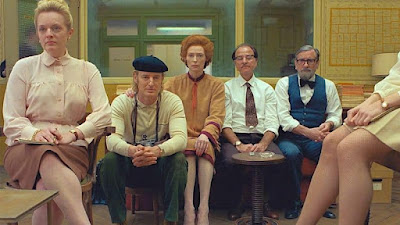After a relatively flabby -- for him-- but grandly rewarded by the Hollywood, "Grand Budapest Hotel", Wes Anderson rehabilitated himself by his latest "French dispatch". His stellar status has grown so much that major stars such as Adrien Brody, Elizabeth Moss, Saorise Ronan, Willem Dafoe and Leah Seydoux agree to play cameos in his movies, some being dressed in totally unrecognizable attire, without one thereof or in quite subdued roles.
The critics who consider this movie disorganized simply cannot handle cinematic art divorced of a specific "moral" message, usually feminist, racial, anti-Russian or some other kind. It shares the same name-dropping routine as the "Mank". Namely, the person other than a graduate student in American journalism has to do a prominent search in Wikipedia -- inconvenient in a dark movie theater -- to get any idea of his allusions.
Why Brody's character, whose prototype was strangely identified with David Duveen by the cineasts -- despite his lack of promotion of the modernist art -- is being made up and dressed like Jean Cocteau, who indeed was a tireless promoter? Is "French dispatch" a code word for "New Yorker" -- again the majority of the cineasts' suggestion -- or "Paris Review", which is the minority opinion? Was this ambivalence random or contrived by Anderson? Why the 1968 revolutionary leader is called Zeffirelli and what connection that has with the opera? Because he could not be called Feltrinelli or Cohn-Bendit? His is a very American movie despite being set up and filmed in France -- and obviously the member of New York cultural elite can explain all the minute details by Anderson -- but it is good all the same.


No comments:
Post a Comment